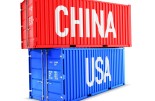Han Dieperink: We are becoming more and more like China
Han Dieperink: We are becoming more and more like China

This column was originally written in Dutch. This is an English translation.
By Han Dieperink, written in a personal capacity
The only way the United States and Europe can counter Chinese influence in the world is by becoming more like China themselves.
While China is increasingly promoting the free market, the United States and Europe want to restrict the free market to thwart China. But China could just as well use a trade boycott to get its way economically or politically.
More than a hundred years ago, US immigration authorities banned Chinese from entering the country. When China responded by boycotting all American products, the problem was quickly resolved.
China is now the second largest economy in the world and its power has increased significantly. The American economy and the Chinese economy are also strongly intertwined (Chimerica). Without China there is no Wal-Mart and no Apple. It's playing with fire.
Trade dispute flares up again
According to the European Union, there is sufficient evidence that Chinese electric cars are being subsidized and therefore dumped in Europe. This could mean that an additional levy will be introduced from July this year. China is now investigating whether French cognac is also being subsidized, which means China is hinting at countermeasures. The most important customer for French luxury goods is still the Chinese.
In a similar way, Chinese train manufacturer CRRC is unable to gain a foothold in Bulgaria. Vestager says the EU will do everything it can to keep China out. While the production of trains and cars in Europe is heavily subsidized. The French in particular have a reputation to uphold in that regard.
In recent years, several countries have been targeted by Chinese sanctions. This may concern trade conflicts, but also maritime disputes. For example, in 2017, China was concerned about the deployment of an American missile defense system in South Korea and was also politically irritated by the visits of the Dalai Lama, although the irritation quickly subsided after the tongue incident. The awarding of the Nobel Peace Prize to a Chinese dissident was also good for economic countermeasures. When Australia pushed for an investigation into Covid-19, a boycott of Australian coal followed.
China has several options to respond. In addition to imposing higher rates, this can also be done by banning goods for health or safety reasons. Individual companies can also be tackled, such as Apple, Micron and Boeing in the past. However, the US also does this by banning European (chip) companies from entering China. Cars are almost always a point of contention and since China is the most important car market in the world, the country has an important trump card.
Freedom is increasingly under pressure
Last week, the US Congress pushed for a ban on Tiktok. Now Tiktok is little more than a glorified Instagram, but in 'the land of the free' everything is being done to ban Tiktok. According to Congress, the only solution is to transfer Tiktok into American hands.
Now, from 1933 to 1945, Churchill – as a strong supporter of rearmament by the British government – was not allowed to talk to the BBC. Nowadays governments go much further. Whether it concerns viruses or vaccines, the government is apparently allowed to determine what the population may or may not think. For example, the media was extensively monitored during the pandemic. Apparently anything can be banned under the guise of 'hate speech' or Fake News.
In Canada, Trudeau has dedicated a special law to it. In the Netherlands, the supervisory authority now determines which words financial institutions may or may not use in the context of sustainability. This after the European Union had previously made the decision on ethically sustainable issues.
From now on, Brussels determines what European citizens are allowed to think and express regarding issues such as nuclear energy and abortion. It is also strange that the EU - without a clear legal mandate - can simply determine which radio and TV channels its citizens may or may not watch and listen to. Channels such as RT and Sputnik are banned by the EU under the guise of systematic manipulation of information and disinformation. That is very vague and an argument that can soon be used against every TV and radio station. Soon the government wants Ungehoord Nederland off the air.
What else comes next under a new right-wing government? Perhaps all these people can read George Orwell's book 1984 again. Governments outside China are also increasingly focusing on monitoring and controlling every aspect of human life.
What does the future bring?
With the US elections approaching, it is likely that the law to ban Tiktok will quickly be abused in Donald Trump's second term. He still has a bone to pick with other American social media. After all, they threw him off their platform after the previous presidency. American citizens can still appeal against this with the help of the First Amendment, but it also turns out that a ban on Tiktok is based on racism rather than anything else.
Obviously, all these interventions are not good for the free market or for competition. The online advertising market is actually divided between Google and Meta. The only real challenger is Tiktok and he is now being silenced.
Americans do not shy away from using economic freedoms to get their way. The US dollar is regularly used as a weapon. Against Iran, against Venezuela, against Sudan and recently against Russia. In the latter case, this may mean that Arabs, Chinese or other countries with a different view are also excluded. Something like this deters foreign investors.
Because the United States and Europe apparently have no difficulty in circumventing the rules of the free market, the impression may soon arise that people are afraid to invest in the United States and Europe, in a similar way that people now fear to invest in invest in China. We are all gradually becoming a little bit Chinese.








